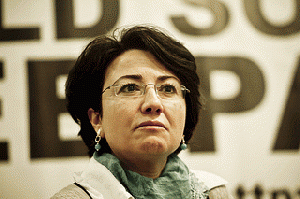Reprinted from Jonathan Cook
Electronic Intifada -- 4 November 2014
The Israeli parliament voted overwhelmingly last week to suspend Haneen Zoabi, a legislator representing the state's large Palestinian minority, for six months as a campaign to silence political dissent intensified.
The Israeli parliament, or Knesset, voted by 68 to 16 to endorse a decision in late July by its ethics committee to bar Zoabi from the chamber for what it termed "incitement."
It is the longest suspension in the Knesset's history and the maximum punishment allowed under Israeli law.
At a press conference, Zoabi denounced her treatment as "political persecution."
"By distancing me from the Knesset, basically they're saying they don't want Arabs, and only want 'good Arabs.' We won't be 'good Arabs,'" she said.
The Knesset's confirmation of Zoabi's suspension comes as she faces a criminal trial for incitement in a separate case and as the Knesset considers stripping her of citizenship.
But Zoabi is not the only Palestinian representative in the firing line. Earlier this year the Knesset raised the threshold for election to the parliament, in what has been widely interpreted as an attempt to exclude all three small parties representing the Palestinian minority. One in five citizens of Israel belong to the minority.
In addition, it emerged last week that a bill is being prepared to outlaw the northern branch of the Islamic Movement, the only extra-parliamentary party widely supported by Palestinian citizens.
Along with Zoabi, the Islamic Movement's leader, Sheikh Raed Salah, has been among the most vocal critics of Israeli policies, especially over the al-Aqsa mosque compound in occupied Jerusalem.
Death threatsZoabi was originally suspended after legislators from all the main parties expressed outrage at a series of comments from her criticizing both the build-up to Israel's summer assault on Gaza, dubbed "Operation Protective Edge," and the 51-day attack itself, which left more than 2,100 Palestinians dead, most of them civilians.
In particular, fellow members of Knesset were incensed by a radio interview in which she expressed her disapproval of the kidnapping of three Israeli youths in the occupied West Bank, but refused to denounce those behind it as "terrorists." The youths were later found murdered.
Zoabi faced a wave of death threats and needed to be assigned a bodyguard for public appearances.
During the Knesset debate on her appeal against the suspension, Zoabi said: "Yes, I crossed the lines of consensus -- a warlike, aggressive, racist, populist, chauvinist, arrogant consensus. I must cross those lines. I am no Zionist, and that is within my legal right."
Zoabi, who has come to personify an unofficial political opposition in the Knesset against all the main parties, is under attack on several fronts.
(Note: You can view every article as one long page if you sign up as an Advocate Member, or higher).






